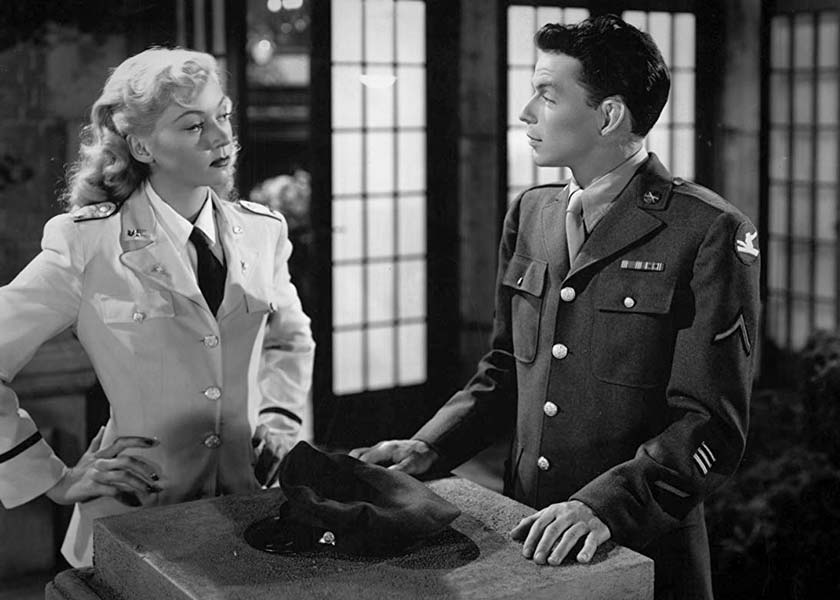Synopsis
Stationed in England after World War II has ended, Danny Miller (Sinatra) guarantees his English friend Jamie Shellgrove (Lawford), a shy pianist and composer, that in Brooklyn a man gains confidence and meets girls. Discharged from the army, Danny returns to Brooklyn and rooms with Nick Lombardi (Durante), a school janitor. Danny works at a music store as a song promoter, and he and Nick perform a duet for the customers. He meets and sings with music teacher Anne Fielding (Grayson).
Jamie, who has decided to try the Brooklyn treatment for his shyness and lack of self-assurance, appears at Danny's door and moves in. Danny has written words for one of Jamie's compositions and happily tells him that it has been accepted for publication. Gaining self-confidence, Jamie meets Anne and falls in love with her.
Among Anne's music pupils is a talented pianist, but his widowed mother lacks the money to pay for music school. The group arrange a concert for the boy, and his brilliant playing earns him a music scholarship. Danny, recognizing that Anne and Jamie are in love, says that he intends to look up the Brooklyn-born nurse he met in England.
Discussion
The slight plot provides frequent opportunities for music, a strange mix of
ballads, jazz, opera, classical, and Durante-style talk-sing, that each major cast
member contributes. Sinatra and Grayson have an operatic duet from Mozart's
Don Giovanni in which Sinatra sings the part of the Don in rather
sloppy Italian. Grayson has a solo operatic aria. Sinatra sings a dull homage to
the Brooklyn Bridge and duets with Durante. His best song is
Time After Time
by Sammy Cahn and Julie Styne, first introduced in this
film. Lawford offers some light singing and awkward dancing. The young pianist
plays a portion of Beethoven's Moonlight Sonata.
Although Sinatra, playing the shy innocent, is top billed, Lawford is the romantic lead. Sinatra appeared in this innocent persona in most of his early films, including the three he made with Gene Kelly: Anchors Away (1945), Take Me Out to the Ballgame (1949), and On The Town (1949). As he reached his mid-thirties and his appearance matured, Sinatra's screen persona became more assured and experienced. This older, more confident character first appears in Danny Wilson (1950).
Jimmy Durante always played himself, no matter what his character name was. His
distinguishing characteristics included a toothy grin, bulbous nose (which earned
him the nickname Schnozzola
), gravelly voice, staccato delivery,
patter-style singing, and wide-open personality. His career began around 1910
playing ragtime and jazz piano. His career in the 1920s turned to vaudeville,
Broadway musicals, radio, and appearing in more than thirty films. His radio shows
had made his voice and personality familiar and beloved to a wide audience. While
not a great performer, Durante is memorable for his one-of-a-kind personality and
unique comic style.
A singer first and an actress second, Kathryn Grayson had a relatively short film career, mostly at MGM, from 1941-55. She made three films with Sinatra and costarred with singing actors Gordon MacRae, in The Desert Song (1953), Mario Lanza and Howard Keel. When film musicals went out of fashion in the mid-1950s, her movie career ended. However, she continued her singing career in stage shows, nightclubs, and personal appearances through the 1990s.
Gloria Grahame, who would later star in the famed noir films In a Lonely Place and The Big Heat, makes her sixth film appearance as a nurse during the English scenes.
Richard Whorf had a varied career as actor, scenic designer and director on stage and screen. He acted in nine films from 1941-44, notably Yankee Doodle Dandy, and directed nine films from 1944-51. His best film is the comedy Champagne for Caesar (1950), starring Ronald Colman and Vincent Price. After 1952 Whorf directed television shows, including 67 episodes of the popular series The Beverly Hillbillies from 1962-64.

